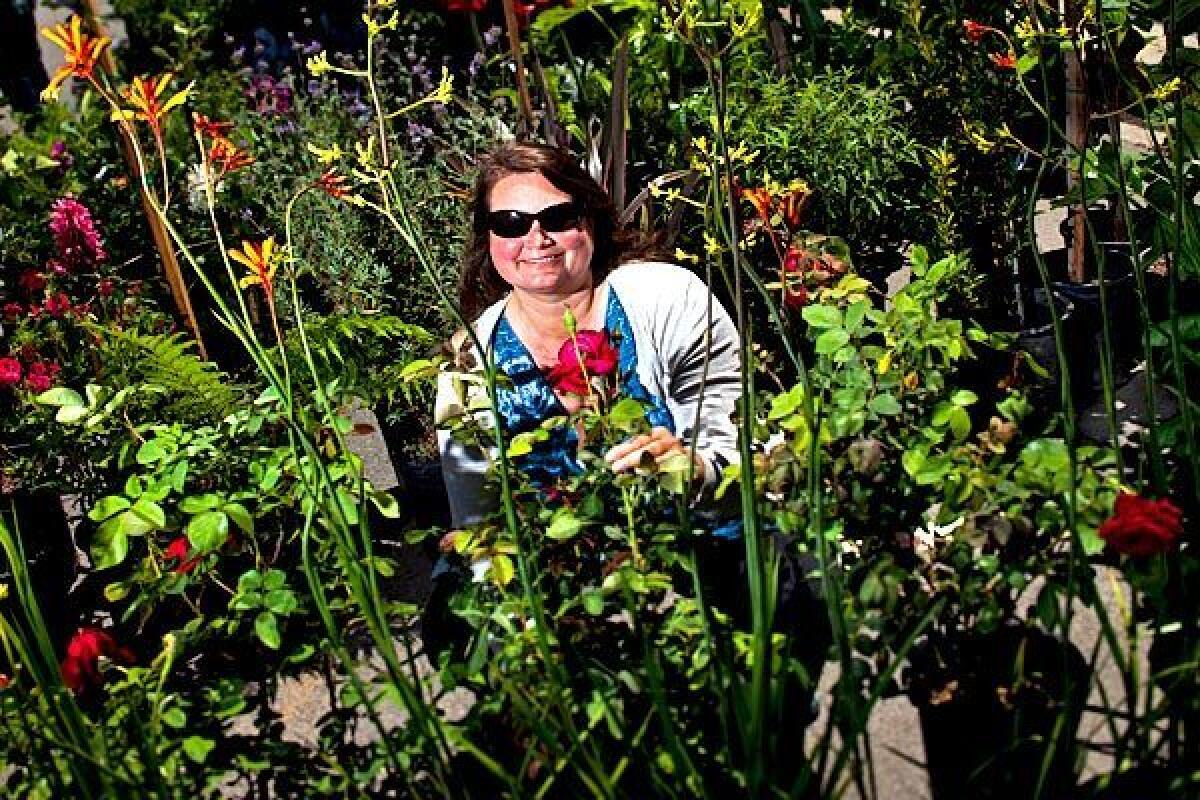Keeping Mar Vista farmers market honest

Early on a recent morning, Diana Rodgers, manager of the Mar Vista farmers market, drove north for two days of farm visits in Santa Barbara and Ventura counties, including to three berry growers in Nipomo. When she arrived, the farms offered gorgeous vistas of rolling dunes and sun glinting off the Pacific, with cool breezes, delicious raspberries and mind-bogglingly aromatic Mara des Bois strawberries.
Rogers chatted amiably with the vendors, some of whom she had known for many years, about their families and their crops. She also asked detailed questions about how many acres they farmed, who did the work, who owned the land and what were the seasons.
Over the course of a long day, however, she caught glimpses of a hidden scenario worthy of film noir. The farmers have also known each other for years, and some of them have nursed long-held, deeply felt grudges; some insinuated or accused others of cheating; one spoke of racism, another of dubious leases, hidden backers and poisoned wells.
“My head is spinning,” Rodgers said that evening as she drove south to a motel in Santa Barbara.
Over the last 16 years, Rodgers, like every good farmers market manager, has had to use multiple skills and perspectives — event organizer, farmer, therapist and detective — to foster two markets: first Santa Monica Main Street, and now, under very different circumstances, Mar Vista. Experienced and thoughtful, she deals weekly with issues great and small, from expelling dog peddlers to advising the state farmers market program.
While far less celebrated than film directors or restaurant chefs, farmers market managers such as Rodgers are equally responsible for the identity, success and integrity of their enterprises, even if most shoppers don’t even know they exist. They choose the vendors, set the tone and enforce the rules.
And though Rodgers is certanly not the only good farmers market manager in Southern California — there are many who share the same joys and frustrations — she is one of the leaders.
“Diana is one of the best managers in the business,” says Mary Lou Weiss, veteran manager of the Torrance farmers markets. “She’s a real mover and shaker.”
About half of all new markets don’t survive, but the Mar Vista venue, founded in 2006, has flourished, growing from 15 to 70 stalls, divided roughly 60%-40% between certified farmers stalls and food stands. After begging farmers to come at first, she now often has to turn them away. Just as important, the market has come to serve as a town square where residents meet their neighbors as well as buy produce.
Managing the Mar Vista market is close to a full-time job, says Rodgers, although much of her work is imperceptible to the public. For example, in recent weeks she has sought relief from the Los Angeles County Department of Public Health from new rules that would have required her to replace new sinks, which she and many managers had already installed, at considerable expense.
When Rodgers first took over the market, she had to scrape by on a salary of $1,200 a month, drawn from fees paid by vendors (7% of sales for farmers), which also fund market expenses. Now that the market is thriving, she gets several times that, but a career in managing will never be a road to riches, she said.
Rodgers meets regularly with other local managers in a group, recently incorporated in a chapter of the California State Grange, to discuss a broad range of issues such as street closures, regulatory requirements and quarantines. And in January she was appointed as an alternate to the Certified Farmers Market Advisory Committee, which helps guide the state program.
Market integrity, always a concern for Rodgers, has become a priority since media reports last fall about vendors who sold produce they’d bought from the wholesale market rather than what they’d grown themselves. She evaluates farmers who apply to sell at her market by checking that they haven’t been cited for peddling by agricultural authorities, by asking which other markets they sell at, by vetting them with other managers whose opinions she respects and by visiting the farms.
Verifying integrity can be tricky. Brief farm visits like the ones she recently did are enough to catch blatant cheaters, Rodgers says, but won’t nail those who grow a plausible amount for show and then buy the rest. The new mantra for integrity-conscious managers is “do the math”: check records of farmers market sales against estimates of production on the farmer’s certificate, issued by county agricultural inspectors.
But the variables, such as crops, growing areas, seasons and sales to wholesale outlets are so complex that it’s difficult for even a determined manager to catch cheaters, who have grown increasingly creative in exploiting the loopholes in market rules, Rodgers said.
The problem is that farmers markets have proliferated, but agricultural commissioners have scant resources for inspections. Rogers recently took a lead role in rallying support for a plan, proposed by a committee appointed by the California Department of Food and Agriculture, to increase the stall fees paid by farmers in order to fund enforcement and manager training. If this plan fails to gain the needed authorization from the state Legislature, as now seems likely, local managers may need to band together to hire professional investigators if they are to protect customers against fraud, Rodgers said.
Meanwhile, she has engaged the community around the market by donating produce from her farmers to an after-school program at a neighborhood youth association; showcasing herbs and vegetables from a learning garden at nearby Venice High School; holding festivals, such as Cinco de Mayo, that appeal to the area’s many Oaxacan residents; providing space for environmental and nutrition booths; and even by establishing a free dog-sitting area for shoppers.
Like many good managers, she provides customers with information to guide their produce choices, by posting on the market’s website a map with descriptions of growing practices for each of her farmers. She also forbids vendors from displaying signs with misleading or meaningless phrases, such as “naturally grown” or “no spray.”
Rodgers knows farmers markets from the vendor’s side as well. In 2008, she and her boyfriend, Tom Turner, started a flower farm, Crane Creek Growers, on 7 acres near Petaluma in Sonoma County. She commutes there each week, and they sell at six upstate farmers markets, as well as through a community-supported agriculture program. Being a grower has helped her understand many things, like how difficult it is for the farmers at her market to bring a consistent supply of produce each week, she said.
Rodgers was born in 1965 to an anthropologist and a Jungian analyst; she grew up in Santa Monica Canyon and Philadelphia. After earning a bachelor’s in world arts and cultures at UCLA and a master’s in psychology at Antioch, she became interested in farmers markets when she read the book “Diet for a New America” by John Robbins and was “horrified by factory farming.”
In 1994, she was hired as an assistant to the Santa Monica farmers market supervisor, Laura Avery, who mentored her. The next year, Rodgers took over as manager of the Sunday Main Street market, which was new and struggling. By finding the right mix of quality vendors and juggling the demands of customers, farmers and local merchants, she gradually developed a wildly popular market. But she eventually tired of the politics, she says, and left in 2005 for the Bay Area.
After a year of reflection, she returned to manage the fledgling Mar Vista market, also on Sundays, sponsored by an association of local residents and business owners. At Santa Monica she could rely on the city for help with things like electrical hookups, signs and forklifts, but on her own in Mar Vista, she had to scramble for logistical support.
“I didn’t sleep on Saturday nights, because I was thinking about every little detail,” she remembered.
And when all else fails, she can always fall back on the lessons she learned while getting her degree in psychology, which she pursued with the intention of becoming a psychotherapist. At one recent market she gently but firmly had to tell a young man trying to sell a pit bull puppy that he couldn’t do that there.
As in dealing with more mainstream vendors, she says, she tries to be “friendly, but not too friendly, and consistent about rules and consequences.”
More to Read
Eat your way across L.A.
Get our weekly Tasting Notes newsletter for reviews, news and more.
You may occasionally receive promotional content from the Los Angeles Times.









